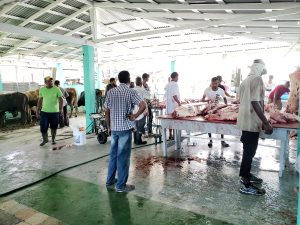MUSLIMS countrywide celebrated the festival of Eid-ul-Adha which means “feast of the sacrifice” on Monday which was marked by special prayers and feasts.
Later in the day, Muslims used the opportunity to visit families and friends and to give gifts and money. Additionally, some believers set aside certain amounts of money to prepare food and to buy clothes for those who are in need.
Acting President of the Central Islamic Organisation of Guyana (CIOG), Gulzar Namdar, said the practice of Qurbani can be traced back to the Prophet Ibrahim, who had dreamt that God ordered him to sacrifice his only son, Ismail.

In his devotion to God, Ibrahim agreed to follow his dream and perform the sacrifice, but God intervened and sent a ram to be sacrificed in Ismail’s place, Namdar said.
Imam Namdar, who is also the President of the Meten Meer Zorg Islamic Complex, explained that Ismail was spared because Ibrahim proved he would sacrifice his son as an act of piety, despite the loss it would have caused him. “The continued practice of sacrifice acts as a reminder of Ibrahim’s obedience to God… the meat is also distributed to the poor and less fortunate people within the community because you want the day of the festival to be a day of enjoyment, a day of rejoice for everybody around you in the community irrespective of their religion,” he said.
Imaam of the Meten Meer Zorg (East) Masjid, Halim Khan, said every year during the Islamic month of Dhul Hijjah, Muslims around the world slaughter an animal– a goat, sheep or cow– to reflect Prophet Ibrahim’s willingness to sacrifice his son Ismail, for the sake of God.
He said when families receive Qurbani meat it fosters a real sense of hope for them and allows them to celebrate the important occasion along with millions of other Muslims across the world.
The Imam explained that Eid-ul-Adha usually begins on the last day of the Hajj, the annual Muslim pilgrimage to Mecca in Saudi Arabia.
Any Muslim, Khan said, who has the financial means to undertake the pilgrimage, is expected to take part in it at least once in their lifetime since it constitutes one of the five pillars of Islam.

Almost 2.5 million pilgrims, Khan said, took part in a symbolic stoning of the devil in Mina, where they threw pebbles at a pillar to symbolise casting away evil.
He said this is the second Islamic festival of the year and follows Eid-ul-Fitr which marks the end of Ramadan, the holy month of fasting.
“Elsewhere around the world, people welcomed the start of Eid-ul-Adha with large gatherings for prayers,” he said.
Member of the Kitty Masjid, Dan Rahim, said as detailed in the Quranic story of Ibrahim, it is still common practice for people to distribute meat during the festival, often sacrificing their best halaal animals in the process.
He said that Muslims will also chant the Takbeer, which is the Arabic phrase “All?hu Akbar”, or “God is great”, before and after Eid prayers. Rahim said that the festival traditionally lasts four days, with the first day marking the end of the yearly Hajj pilgrimage to Mecca, Islam’s holiest city.



.jpg)









